One of Taiwan’s best food adventures can be found at its ubiquitous rechao (熱炒), or stir-fry joints. Greasy food swinging round the lazy Susan, booze flowing in tiny glasses, cigarette plumes wafting. Once, I downed whiskey shots with a drunken proprietor. Another time I shared a toilet stall with the restaurant’s resident tortoise. I gave up on bringing my parents — oh the horror of the fish tanks outside.
Third Floor (?樓), however, flips the script. We slip back in time through an unremarkable speakeasy-style entrance — and into the coolest courtyard I’ve seen in Taipei. As a European, I miss nothing more than a bit of al fresco, no match for Taipei’s sticky summers.
Giving the illusion of outdoor dining, the three-story courtyard has full-size trees and paved floors, but with comforting finishes of air conditioning and woven bench covers, the warm glow of vintage lamps and 80s Americana beats. It’s a real time-vortex, bursting with retro charm and insider cool.
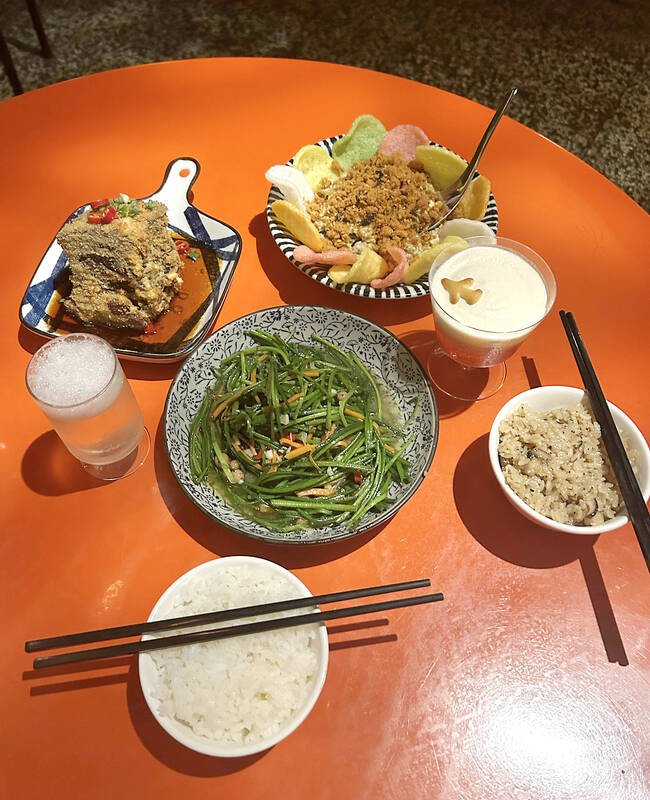
Photo: Hollie Younger
This place is expensive enough to give my local stir-fry boss a conniption. But we see it as more of a vibe tax, an experience in and of itself.
The menu is handwritten in Chinese, pegged onto wooden boards. The waitress recommends sharing two to four dishes between two. So, we grab four, with four cocktails to match — all, of course, in the name of research.
Third Floor’s signature is the Dongpo Rou (NT$420), a beloved Chinese dish of fatty and lean pork belly cubes braised in soy and ginger. Tonight’s other-worldly upgrade is a mighty hunk of meat larger than two of my fists, breadcrumbed and fried, sitting in a pool of inky-black Dongpo sauce.
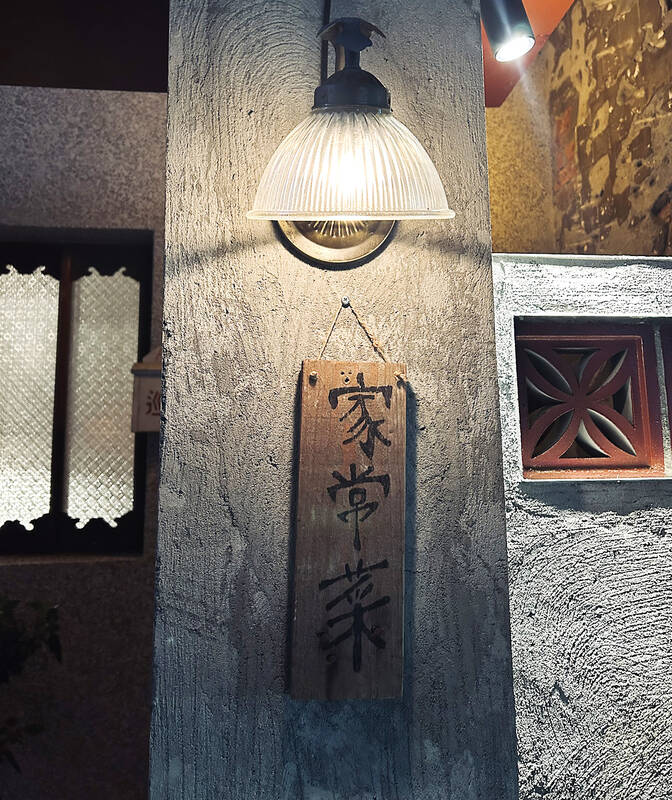
Photo: Hollie Younger
Cutting into the crispy exterior, the pork inside is glistening and comes apart with a fork, falling into the decadent sauce below. This is the dish I’d come back for time and again.
It’s reminiscent of an English roast pork with a stuffing crumb but with a smoky barbecue-like flavor and a hit of chili and Asian aromatics. I’m not a fan of fattier cuts, but this was surprisingly lean. Texturally, it’s a world away from the gummy standard.
We order a three-cup duck breast (NT$350); a familiar find at every stir-fry joint, usually in chicken or mushroom variety. Seeing one of my favorite proteins, I had to try.
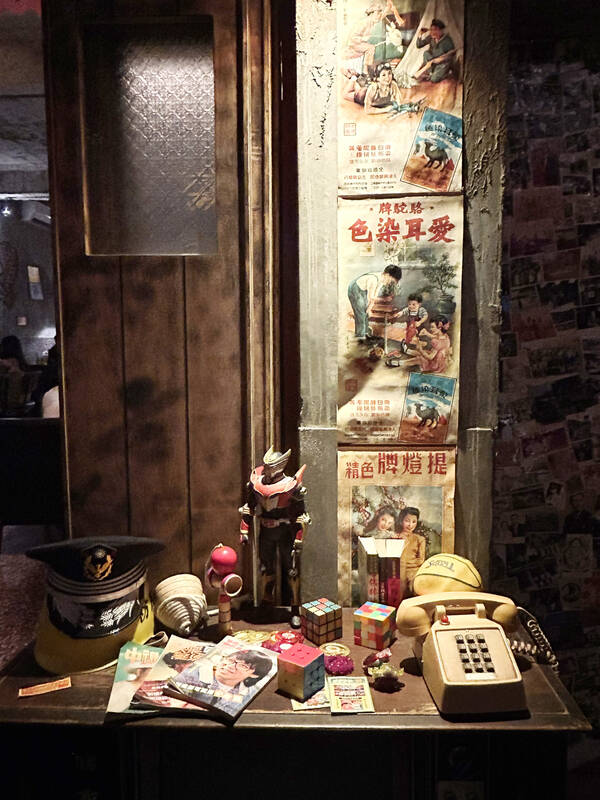
Photo: Hollie Younger
The presentation matches the decor, think an Asian grandma’s floral crockery. The duck breast? A little chewy. But underneath, nuggets of King Oyster mushroom have soaked up all that ginger and chili; it’s heavy on the sesame and bold on the basil.
Next, we get adventurous with our waitress’ recommendation of a childhood staple, Century-egg chopped salad with colorful shrimp crackers (NT$230). We treat it like a Taiwanese chip and guac for the table, intermittently scooping into the cold dip. Not for the uninitiated, these blue-black fermented eggs are salty and tangy — it’s hard to get on board without the nostalgia.
Stir-fry joints typically invite patrons to grab large bottles of Gold Medal at the fridge to crack open at the table. Third Floor instead has a wine list and a pretty out-there cocktail menu.
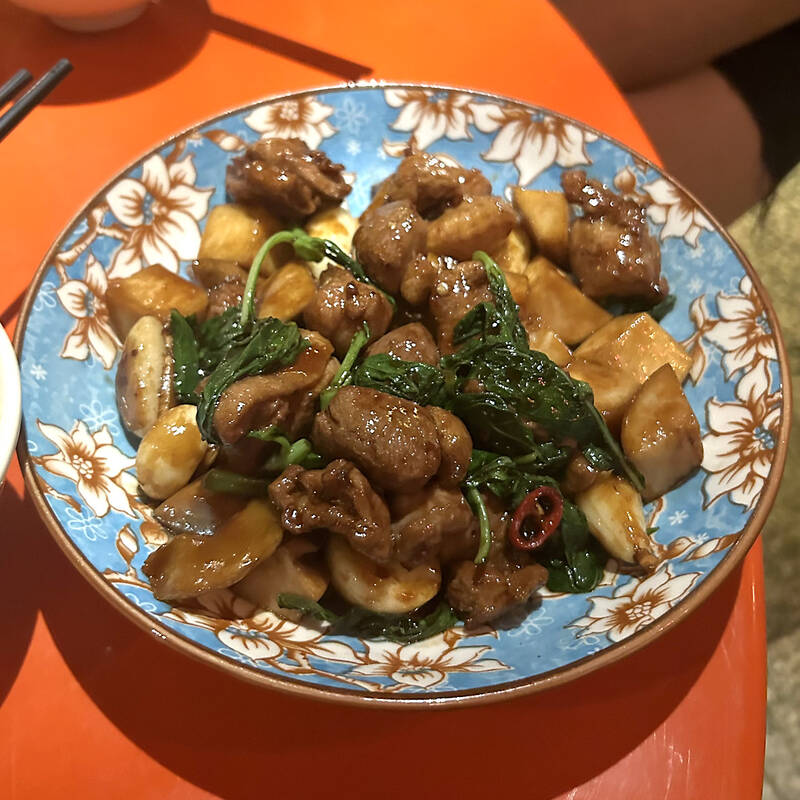
Photo: Hollie Younger
The best was Raspberry, Butter, Goat Milk and Apple (NT$400), a frothy pink concoction that’s sweet and fruity with a bite of goat’s milk. It only gets stranger from here.
If the Dongpo pork dish wasn’t enough, we get daring with the next cocktail, Dongpo Sauce, Laurel (NT$350), as black as soy sauce with a strong whiskey hit. My Peanut Butter, Macadamia cocktail (NT$380) is equally vicious on the palette. The staff did warn us they’d be strong.
The night wraps up with three free shots from our waitress — proof that for all its class, Third Floor hasn’t outgrown its stir-fry roots, serving up Taiwanese culture, family-style dishes and just the right amount of booze.
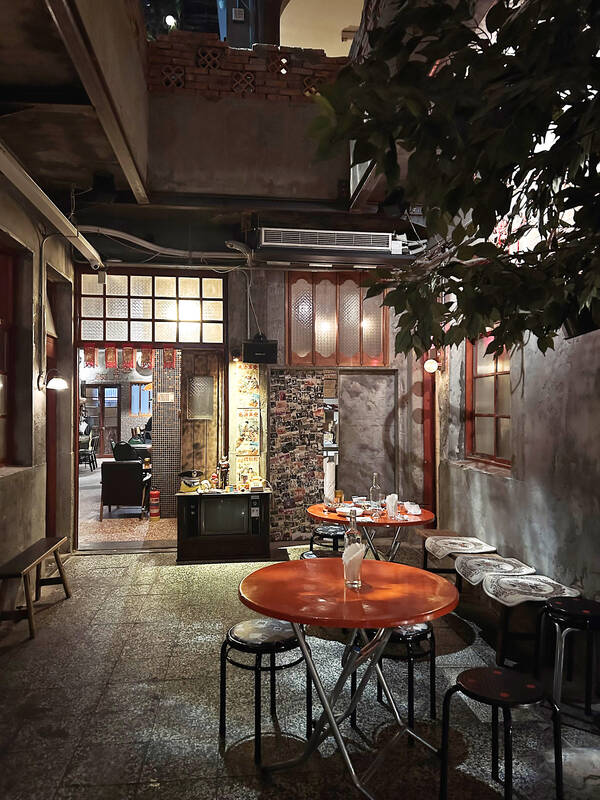
Photo: Hollie Younger

In the March 9 edition of the Taipei Times a piece by Ninon Godefroy ran with the headine “The quiet, gentle rhythm of Taiwan.” It started with the line “Taiwan is a small, humble place. There is no Eiffel Tower, no pyramids — no singular attraction that draws the world’s attention.” I laughed out loud at that. This was out of no disrespect for the author or the piece, which made some interesting analogies and good points about how both Din Tai Fung’s and Taiwan Semiconductor Manufacturing Co’s (TSMC, 台積電) meticulous attention to detail and quality are not quite up to

April 21 to April 27 Hsieh Er’s (謝娥) political fortunes were rising fast after she got out of jail and joined the Chinese Nationalist Party (KMT) in December 1945. Not only did she hold key positions in various committees, she was elected the only woman on the Taipei City Council and headed to Nanjing in 1946 as the sole Taiwanese female representative to the National Constituent Assembly. With the support of first lady Soong May-ling (宋美齡), she started the Taipei Women’s Association and Taiwan Provincial Women’s Association, where she

Chinese Nationalist Party (KMT) Chairman Eric Chu (朱立倫) hatched a bold plan to charge forward and seize the initiative when he held a protest in front of the Taipei City Prosecutors’ Office. Though risky, because illegal, its success would help tackle at least six problems facing both himself and the KMT. What he did not see coming was Taipei Mayor Chiang Wan-an (將萬安) tripping him up out of the gate. In spite of Chu being the most consequential and successful KMT chairman since the early 2010s — arguably saving the party from financial ruin and restoring its electoral viability —

It is one of the more remarkable facts of Taiwan history that it was never occupied or claimed by any of the numerous kingdoms of southern China — Han or otherwise — that lay just across the water from it. None of their brilliant ministers ever discovered that Taiwan was a “core interest” of the state whose annexation was “inevitable.” As Paul Kua notes in an excellent monograph laying out how the Portuguese gave Taiwan the name “Formosa,” the first Europeans to express an interest in occupying Taiwan were the Spanish. Tonio Andrade in his seminal work, How Taiwan Became Chinese,